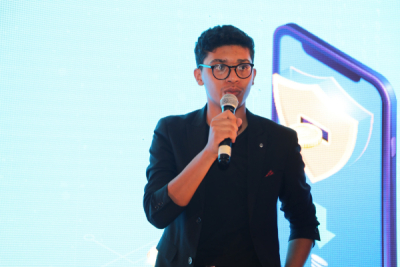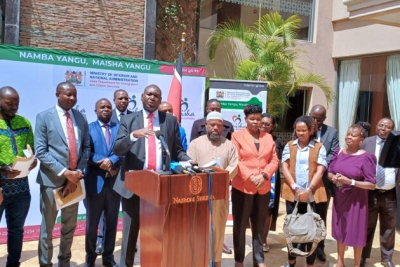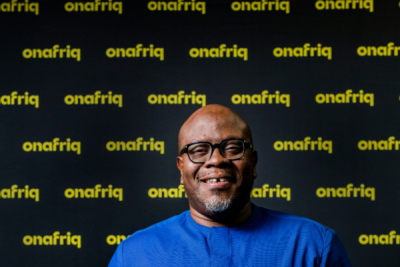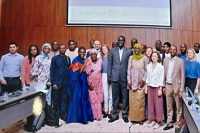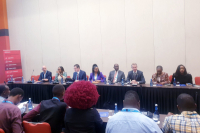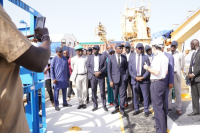Jessica Boonstra, the founder of Yebo Fresh, began her adventure in her garage. Fast forward a few years, she has completed several rounds of financing and is positioning her startup in a niche e-commerce segment in South Africa.
Yebo Fresh is an e-commerce solution developed by a South African startup. It enables grocery retailers in the townships of Cape Town and Johannesburg to stock up on food products from a mobile application or a web platform. The Cape Town-based startup was founded in 2018 by Jessica Boonstra. Since its launch, it has already raised around $5.5 million to accelerate its growth and diversify its offerings.
"The global e-commerce revolution should not only be accessible to a handful of South Africans, Yebo Fresh aims to extend this to the majority, and in so doing, accessing a huge untapped market. We use technology, innovative processes, and partnerships to make food shopping easier, cheaper, and safer and we assist in supporting healthier food options for our customers," said Jessica Boonstra.
The solution's mobile app is only available for Android devices. Once downloaded, users need to create an account to access the various services. They can make purchases and have them delivered to their store within 24 hours. In addition to ordering via the mobile application or web platform, it is also possible to place orders via WhatsApp. To do so, users need to send a list of groceries and follow an agent’s guidelines to complete the purchase.
Yebo Fresh has also introduced a deferred payment system. This enables retailers to stock up and pay in installments until the amount due is settled. The company is rolling out that system thanks to a 78 million ($4.2 million) funding round. "The township market is developing rapidly, and we're proud to be at the forefront of its digital revolution," says Jessica Boonstra.
Adoni Conrad Quenum
As an acceleration program, Afriquia 50 Sprints offers innovative startups in the fields of mobility and new energies. This is a unique opportunity to develop and establish a global presence.
Afriquia 50 Sprints is an acceleration and financing program created by Afriquia, a Moroccan fuel distribution company, in partnership with the incubator HEC Paris of Station F, the world's largest startup campus. The program aims to support Moroccan, African, and international startups that introduce disruptive concepts in the fields of mobility and renewable energies.
The program was launched in 2020. It offers sprinters (selected startups) access to a network of experts, mentors, partners, and investors, as well as funding. Startups also benefit from a workspace at Station F in Paris, where they can take advantage of a dynamic and diverse innovation ecosystem.
Startups selected to join the Afriquia 50 Sprints program typically develop solutions in the fields of shared services, autonomy, electrics and connectivity, smart cities, infrastructure, and the last mile segment.
Beneficiaries are incubated at Station F for three months, get support from tutors and entrepreneurs, and take part in various workshops and themed events attended by experts. Their projects are also assessed by a panel of judges at the end of the program. Throughout the incubation period at HEC Paris, Afriquia covers the startups' travel and accommodation expenses.
Some of the startups that joined the Afriquia 50 Sprints program are Pip Pip Yalah, an inter-city car-sharing application, and Cathedis, an e-logistics solution that optimizes the management of goods flows between transport players. The success of these startups is testimony to the program's positive impact on the entrepreneurial ecosystem.
Melchior Koba
Fascinated by computer programming and technology from a young age, he initiated and organized hackathons and technology-centric events during his high school years. He now heads a startup that helps companies recruit the right tech profiles.
Ayhem Ghanmi (photo) is a young Tunisian entrepreneur. He is the founder and CEO of HackUp, a startup that is revolutionizing the tech talent recruitment landscape through an innovative and intelligent matching system.
Ayhem Ghanmi started programming at the age of 15. Inspired by Elon Musk, he has always been interested in Silicon Valley and the world of entrepreneurship. In 2017, the young entrepreneur began organizing technology events and mini-hackathons at Lycée Pilot de l'Ariana (LPA), where he studied from 2017 to 2021.
In 2020, he met Mohamed Aziz Najjar, who gave up his old job to join him in his project. That's how the Tunisian startup that organizes hackathons, HackUp, was born in 2020. HackUp redefines the way recruiters find developers. It developed a digital platform that uses a smart validation process, testing, assessing, and challenging candidates to reveal their tech level. Based on the scores achieved by developers, recruiters can then hire the developers they need.
Thanks to HackUp, Ayhem Ghanmi became, at the age of 18, the first high school student to be awarded the Startup Act label– A legislative measure designed to encourage the creation and development of startups in Tunisia through various incentives, including tax, social and administrative benefits– by the Tunisian government.
HackUp has organized more than five hackathons and has become the first startup in the Middle East and North Africa region to specialize in this field. Ambassador of AngelHack, a Silicon Valley startup, Ayhem Ghanmi was, between May and September 2019, the logistics and events manager for the Tunisia Education Exposition.
At the end of the fifth edition of the intensive Samsung FastTrack program, which took place in 2021, HackUp won first prize at Demo Day, the event that closed the program. In 2022, it was recognized by Najla Bouden, then head of the Tunisian government, as one of the eight startups that shone in their respective sectors.
Melchior Koba
By providing a secure and efficient means of verifying individuals' identities, digital IDs are essential tools for advancing economic growth, promoting transparency, and safeguarding human rights throughout Africa.
The Kenyan government has kicked off the pilot phase of its digital ID initiative and Maisha Namba program. This was disclosed during a recent digital ID briefing, on November 1, by Professor Julius Bitok, the Principal Secretary of Immigration and Citizen Services. The initial phase is focused on young individuals who are applying for their first identification cards as they turn 18 years old.
As part of this initiative, the government plans to transition from the existing second-generation IDs to the new Maisha Card. In that context, the pilot phase aims to identify and address any potential issues to ensure a smooth nationwide rollout.
Julius Bitok noted that "All Kenyans turning 18 years in whichever part of Kenya will be issued with a Maisha Card on a pilot basis. This way, we will establish whether there are any errors or issues before we do the penultimate launch."
The Maisha card is set to replace current national IDs and will encompass various personal identifier data over a transition period of 2 to 3 years. These digital IDs will enable convenient transactions using iris and fingerprints.
President William Ruto previously announced that Kenyans will receive the new digital identification cards starting in December. Also, the official launch of the digital ID platform, initially slated for October 2, was postponed due to unforeseen circumstances.
Over 100,000 booklets containing frequently asked questions about the new identification system have been printed to provide information to Kenyan citizens.
Hikmatu Bilali
Pan-African payments gateway MFS Africa, founded in 2009 by Dare Okoudjou (photo) and based in Johannesburg, South Africa, announced on Wednesday, November 1 its name change to Onafriq. The change comes as the firm embarks on its North American expansion after several acquisitions.
"As we embark on this next phase of our journey, we wanted a name that reflects our aspiration of wiring up the whole continent into one network of networks with pathways from and to every African and every African business," explains Dare Okoudjou.
Maisha Meds, a digital platform that helps people access healthcare at affordable costs, has received $5.25 million in scale-up funding from the US Agency for International Development (USAID).
The funds will support the startup in its aim to extend its mobile software to 7,500 pharmacies and clinics, providing subsidized care to nearly a million patients.
CINOLU is an innovation hub that supports young innovators and entrepreneurs in the DRC. It offers incubation programs and services tailored to the local context, such as training, mentoring, networking, financing, and market access.
The Centre d’Innovation de Lubumbashi (CINOLU) was founded in 2015. With Berry Numbi, an electromechanical engineer, as CEO, its mission is to boost the regional competitiveness of young innovators and entrepreneurs in DR Congo through innovation, technology, and entrepreneurship.
It enables young innovators and entrepreneurs, particularly early-stage companies, startups, and innovative small and medium-sized enterprises, to access business knowledge, and increase their business acumen and network.
The center offers coworking space, organizes boot camps, internships, exhibitions, and conferences, and runs incubation and mentoring programs. In 2018, it was selected by Elan to organize, in Lubumbashi, the incubation program for the winners of the Congo Tech Days Hackathon.
In addition, CINOLU formulates projects and advocates for public policies in favor of innovative online entrepreneurship players. It also offers a wide range of workshops for entrepreneurs, mentors, and coaches.
In addition to its regular programs, the center has a women's laboratory, called Femmes360, which works to empower women and girls in the fields of technology and innovation.
Since its creation, CINOLU, with more than 15 mentors and coaches and over 1,000 beneficiaries, has developed over 150 projects and set up more than 8 programs. It works with government partners, companies, and organizations such as AfriLabs, Afric'Innov, Innovation for Policy Foundation (I4Policy), Meta, Silikin Village, RLabs, and Enabel.
Melchior Koba
The coronavirus pandemic accelerated digital transformation initiatives across Africa but, some countries, like Senegal, were already embarked on that path long before the pandemic. They are still pushing ahead with numerous initiatives.
Senegal's Ministry of Communication, Telecommunications, and Digital Economy, in partnership with the German international cooperation agency GIZ, unveiled GovStack, a platform that dematerializes administrative procedures, at a workshop organized by Sénégal Numérique (SENUM) on Thursday, October 26, and Friday, October 27. GovStack will enable the dematerialization of over 800 administrative procedures.
"Digitization means we can move faster and make things easier for the administration. It's a platform that's available and free to everyone. We are helping the Senegalese government to understand the tool, its scope, and its benefit for the administration," said Katharina Noussi, Program Manager at GIZ.
Senegal kickstarted the digitization of its administrative services in 2017. Since then, authorities have multiplied partnerships and initiatives in the health, justice, and administrative sectors. In 2022, SENUM signed an agreement with the mayors of the 19 communes in the Dakar department to digitize civil status records. Last July, XOF8 billion (around $13 million) was allocated to set up the 2023-2027 Digital Justice Strategy, to build a digital judicial public service that will benefit all players and users in the sector.
The digitization of various administrative procedures should, among other things, improve the accessibility of public services to users, the efficiency and management of these services thanks to the automation of various tasks, and the exchange of data between government departments.
Adoni Conrad Quenum
In the last decade, high-speed internet consumption has grown significantly across Africa. With Covid-19 bringing about new usages, the demand has further increased. Telecom operators are actively mobilizing to efficiently meet these heightened requirements.
The CEOs of six major telecoms groups operating in Africa - Orange, MTN, Airtel, Vodacom, Axian, and Ethio Telecom - have pledged to develop digital inclusion on the continent. On Tuesday, October 17, at the Mobile World Congress (MWC) in Kigali, Rwanda, they expressed their willingness to continue investing in the local telecoms market during an exchange with Paul Kagame, President of the Republic of Rwanda, host of the MWC and also Chairman of the Board of Directors of Smart Africa.
In a joint statement, Jérôme Hénique, CEO of Orange Middle East and Africa, Ralph Mupita, CEO of MTN Group, Segun Ogunsanya, CEO of Airtel Africa, Shameel Joosub, CEO of Vodacom Group, Frehiwot Tamru, CEO of Ethio Telecom, and Hassanein Hiridjee, CEO of Axian Group, said: "Together, we passionately believe in the power of mobile as a catalyst for economic and social inclusion across Africa. We openly invite other African Heads of state to engage with us in the search for solutions focused on deepening digital and financial inclusion on the continent for the benefit of all African citizens."
The telecom groups have already identified potential solutions that can facilitate comprehensive coverage of the continent with a high-quality mobile broadband network, ensuring affordable access to services. But for these solutions to materialize, they stressed the need for African governments to get involved and engage in in-depth collaboration.
Telecom operators are calling for tax and policy reforms. They believe that by reducing the amount of taxes on different segments (equipment, services, accessories, telephones, etc.), their operating costs will be positively impacted. The resulting reduction in expenditure will strengthen investment capital for the development of telecoms infrastructures across the continent, and support consumption. The same effect should be induced by infrastructure sharing, national roaming, and regulatory policy reform, among others.
Telecom groups are also calling for regulatory support for new models of digital infrastructure financing. The World Bank estimates that $100 billion will be needed to achieve universal connectivity in Africa by 2030. The necessary funds cannot come from telecom companies alone.
Last but not least, climate-friendly infrastructure is an investment that telecom groups are more than willing to make. Given the beneficial impact of solar energy on the operating and maintenance costs of telecom towers and other infrastructures and its contribution to companies' carbon footprints, the CEOs of Orange, MTN, Airtel, Vodacom, Ethio Telecom, and Axian also expressed the need for concerted regulatory policies that promote access to green solutions.
Mobile operators claim to have invested over $70 billion, over the past 10 years, in the construction of mobile infrastructure in Africa. They estimate their annual capital expenditure in sub-Saharan Africa at between $6 and $8 billion, or nearly 20% of their revenues. Although this action today gives nearly 85% of the African population access to mobile broadband connectivity (compared with a global average of 95%), more than 680 million people remain unsubscribed to mobile broadband services either because of the high cost of access, or the inaccessibility of suitable phones.
According to the six groups, the telecoms industry currently contributes 8.1% to the Sub-Saharan region's Gross Domestic Product (GDP). That's around $170 billion. By 2023, the target is to reach $210 billion by raising the mobile Internet usage rate from the current 33% to 50% by 2030.
The 2Africa cable, spanning 45,000 kilometers, is poised to connect 33 countries across three continents, enhancing connectivity for more than three billion individuals.
The 2Africa subsea cable from the eponymous consortium led by the American company Meta has landed off the coast of Dakar in Senegal. Its installation began on Tuesday, October 31, with the arrival of a cable ship from Alcatel Submarine Networks (ASN), a Nokia subsidiary entrusted with the construction of the cable. ASN will carry out the installation works in collaboration with Sonatel, the telecommunications firm overseeing the construction of 2Africa's landing station in Senegal.
"We are in the digital age. Therefore, we anticipate a more than double surge in 4G traffic in the next five years, alongside the emergence of 5G, which will further catalyze an exponential spike in usage. Therefore, it is imperative to equip Senegal adequately to meet the escalating demands from our customers," said Sékou Dramé, CEO of Sonatel.
The introduction of the 2Africa cable reinforces Senegal's domestic broadband infrastructure. Presently, the nation is linked to four international fiber optic submarine cables, namely SAT-3 (South Atlantic 3), ACE (Africa Coast to Europe), ATLANTIS-2, and SHARE (Senegal Horn of Africa Regional Express). Nonetheless, recurrent outages across these networks are causing disruptions to internet services across the country and in neighboring regions.
In early August, cuts to the ACE, WACS, and SAT-3 cables resulted in internet outages and slowed connectivity, for weeks, in several African countries, including Senegal.
The connection to a new cable will improve connectivity, offering better business opportunities, enhancing investment competitiveness, and stimulating growth by accelerating progress in several sectors, notably education and health. Senegal has 19.2 million Internet subscribers, representing a 108.31% penetration rate, according to the latest statistics from the Regulatory Authority for Telecommunications and Post (ARTP).
Samira Njoya
More...
With a degree in geoinformatics and geospatial intelligence, he helps companies better understand their markets and customers. His expertise has enabled his company to be selected by leading accelerator programs.
Bakuena Ntshasa (photo) is the co-founder and CEO of Brandbook, a startup that helps companies understand how best to serve their markets and customers. Born and raised in South Africa, the entrepreneur completed his higher education at the University of Pretoria, where he studied geoinformatics and geospatial intelligence.
Through Brandbook –founded in 2018, he offers businesses comprehensive insights into their brands, consumers, and competitors. He also facilitates the identification and targeting of new opportunities in relevant consumer categories and channels while also enabling a comprehensive understanding of a consumer's entire journey, ensuring a tailored response to their needs.
Based on purchase data as well as demographic attributes and habits, Brandbook's products enable retailers to easily generate comprehensive buyer segments. It also enables companies to understand visitors’ motivations, making it easier to drive sales.
One of the company's offerings is Ibottit, a shopping rewards app that launched in 2021. This app allows users to accumulate points and gifts by uploading images of their purchase receipts, whether in-store or online. Points accumulated can be redeemed for digital vouchers.
In 2018, the company was selected along with 9 other startups by Startupbootcamp AfriTech to take part in its acceleration program. In 2019, it was selected for the fourth edition of the Google Launchpad Africa accelerator.
During his studies, Bakuena Ntshasa worked at the University of Pretoria as a laboratory technician between 2015 and 2018, as well as portfolio manager for administration, finance, and discipline at Hatfield Studios, a private student residence not far from the University of Pretoria.
Melchior Koba
African countries need reliable internet connections to achieve the objectives set out in their respective digital transformation agendas. Consequently, the need for these countries to collaborate with partners capable of bolstering their ambitions has become increasingly imperative.
On the sidelines of the China-Africa Digital Capacity Building Cooperation, Uganda signed an agreement with China to enhance connectivity nationwide.
Commenting on the new collaboration, the country’s ICT Minister, Chris Baryomunsi, said that it would help build the infrastructure needed to ensure internet access for the whole country.
"China is ahead of us in terms of technology and has been a key pillar in connecting internet cables to different parts of the country. Through this cooperation, we shall build new infrastructure, equipment, and training and provide services to all Ugandans," said Chris Baryomunsi.
This new initiative is part of the Ugandan government's ambition to accelerate digital transformation to support economic recovery, create unlimited opportunities for youth, and achieve "Vision 2040". Last March, the executive secured 1,800 billion shillings (477.4 million USD) in funding from the World Bank to expand Internet access in the country.
At the end of this partnership, which is already being implemented, Uganda will benefit from improved Internet connectivity coverage at affordable costs. The partnership will also enable people in remote areas to familiarize themselves with the public services set up by the government via digital platforms.
Samira Noya
Digital Realty aims to position itself as one of the most important data providers on the African continent. To achieve this, management is making strategic decisions.
Medallion Data Centres, a Nigerian data center provider, has been renamed Digital Realty, after its parent company. The name was officialized at a ceremony held in Lagos on Friday, October 27.
"We have made a strategic decision to align with Digital Reality and we are proud to be part of one of America’s largest Public Companies. For over a decade, we have been at the forefront of the Nigerian digital economy through the provisioning of carrier-neutral data center services in both Lagos and Abuja," said Ikechukwu Nnamani (photo, center), founder of Medallion Data Centres.
The Nigerian data center provider entered Digital Realty’s portfolio in 2021. At the time, the American firm, which owns over 300 facilities in more than 50 cities worldwide, decided to finance the Nigerian firm’s expansion on the continent with a $500 million package. Before this name change, Medallion Data Centres inaugurated a new data center in the city of Lagos on October 24 to expand its capacities.
"We are going to take advantage of the huge opportunity to both meet growing customer demand for connectivity in Africa and improve the internet infrastructure that serves over one billion people who don’t yet have proper access to the benefits of the Internet," said Mike Hollands (photo, right), Digital Realty's Vice President for Market Development.
Adoni Conrad Quenum
In Africa, digital transformation is accelerating across all countries. However, some countries are more focused on quickly achieving their digital goals than others. In Rwanda for instance, the government is hard at work to complete some of its digital projects by 2024.
The Rwandan government will soon launch a unique digital identification system (SDID) and deploy 5th generation (5G) technology in the country. Rwanda's Minister of ICT and Innovation, Paula Ingabire, confirmed this recently in a podcast produced by the private Rwandan newspaper, The New Times.
"We’ll start very soon with what we call the pre-enrolment phase which is about enrolling citizens and getting their biometrics. The current ID that we have is given only to people who are 16 years and above, but we’ll provide the digital ID from birth. That’s one exciting aspect of the digital ID," she said.
The new system, which is currently being rolled out, is financed to the tune of $40 million by the World Bank. It will be based on a national population register containing the biographical and biometric data of all Rwandan citizens, including those from the diaspora and foreigners living in the country.
During the same broadcast, the Minister also mentioned that the first 5G tests were recently successfully carried out in the country from the stratosphere using a prototype unmanned aerial vehicle (HAPS). During the test, 5G connectivity was provided for around 73 minutes at a maximum altitude of 16.9 km, ts2.space reveals. These ongoing initiatives, among others, are part of the Rwandan government's commitment to enhancing public service delivery across diverse sectors. They aim to expand internet accessibility across the nation, encompassing even remote rural communities, and providing an identity to every citizen.
Samira Njoya




